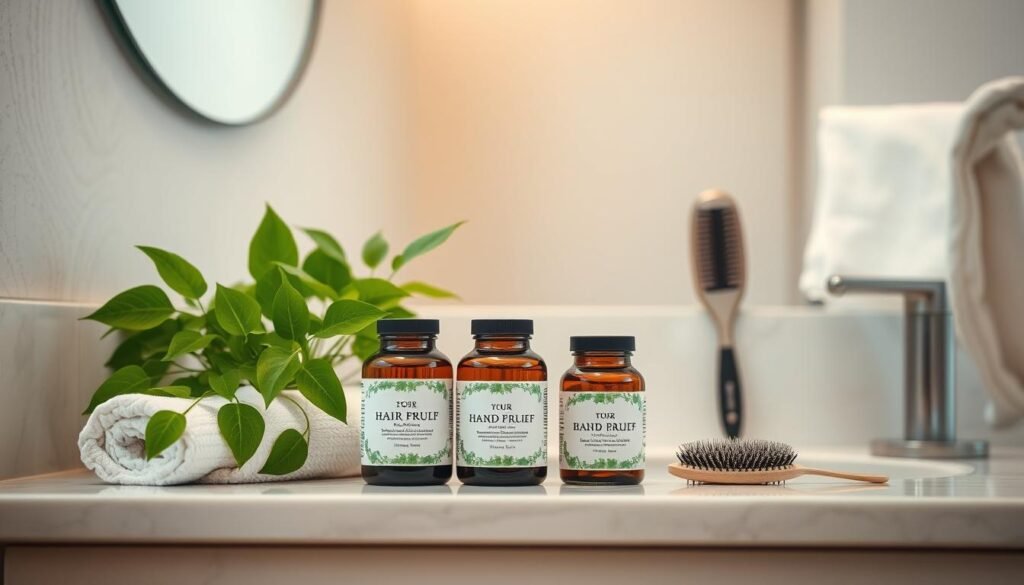Ever wonder why dandruff bothers some people more, even with the same shampoo? Dandruff isn’t just a minor embarrassment. It’s a condition that can be tackled with the right diet and supplements. This article will show how supplements can help soothe your scalp and fight dandruff. By knowing why dandruff happens and its signs, you can find the best natural remedies. This leads to a healthier scalp.
Key Takeaways
- Dandruff can be treated effectively through nutrition and lifestyle changes.
- Supplements may aid in achieving a healthy scalp and reducing dandruff symptoms.
- Choosing nutrient-rich solutions is essential for maintaining scalp health.
- Understanding the causes of dandruff helps in selecting appropriate treatments.
- Natural remedies, coupled with supplements, can enhance overall scalp care.
Understanding Dandruff: Causes and Symptoms
Dandruff is a common scalp condition marked by flaky dead skin. These flakes appear on the scalp or in the hair. It causes discomfort and can be embarrassing. Knowing why dandruff happens and its symptoms can help treat it.
What is Dandruff?
Dandruff shows up as flaking skin. It happens when the scalp sheds dead skin cells too fast. You’ll see white or yellow flakes, which stand out on dark clothes. It’s not severe but can cause an itchy scalp.
Common Causes of Dandruff
Many factors can lead to dandruff. Key causes include:
- Dry Scalp: Low moisture leads to flakes and worse dandruff.
- Seborrheic Dermatitis: This causes red patches and bad dandruff from inflammation.
- Fungal Infections: Malassezia fungus on oily skin increases flaking.
- Sensitivity to Hair Products: Some products irritate the scalp, causing dandruff.
Symptoms Associated with Dandruff
Knowing dandruff symptoms can help in fixing the problem. Common symptoms are:
| Symptom | Description |
|---|---|
| Flaking Skin | Flakes on scalp or shoulders, usually white or yellow. |
| Itchy Scalp | Often feeling the need to scratch, making things worse. |
| Redness | This shows irritation and inflammation on the scalp. |
| Oily Scalp | Dandruff may come with too much scalp oil. |
Getting the lowdown on dandruff’s causes and signs is the first step to treatment. For more help and info on fighting dandruff, click here.
The Role of Nutrition in Scalp Health
Eating right is key for keeping your scalp healthy and dandruff at bay. Eating foods that are packed with vital nutrients can help fight scalp issues like dryness and irritation. Not getting enough of these nutrients can make dandruff worse, so it’s important to watch what you eat.
Essential Nutrients for a Healthy Scalp
Certain nutrients are crucial for a healthy scalp:
- Vitamins: B vitamins, especially biotin, make hair strong and keep the scalp healthy.
- Minerals: Zinc boosts the immune system and fights fungus, which can cause dandruff.
- Fatty Acids: Omega-3s help the scalp stay moist and cut down on swelling.
Getting these key nutrients is very important for your scalp’s health. It can stop dandruff from coming back again and again.
The Impact of Diet on Dandruff
What you eat can really affect your dandruff. Some foods can make it better or worse. Here’s how:
- High Sugar Intake: Too much sugar can make inflammation worse, leading to a flaky scalp.
- Processed Foods: Foods with bad fats can hurt your scalp’s health.
- Hydration: Drinking enough water is good for your skin all over, including your scalp.
Eating lots of fresh foods, like fruits, veggies, lean meats, and whole grains, helps your scalp stay healthy. Making smart food choices can greatly reduce how bad and often dandruff happens.
| Essential Nutrient | Role in Scalp Health | Sources |
|---|---|---|
| Vitamins | Support hair growth and scalp vitality | Leafy greens, nuts, eggs |
| Minerals | Assist in immune function and reduce dandruff | Shellfish, legumes, seeds |
| Fatty Acids | Increase hydration and reduce inflammation | Fatty fish, flaxseeds, walnuts |
Dandruff: Supplement – A Natural Approach
Dandruff supplements take a natural route to improve scalp health. They use various ingredients to feed the scalp from the inside. They focus on the deep causes of dandruff. These supplements are packed with nutrients. They help keep the scalp healthy.
What are Dandruff Supplements?
Dandruff supplements mix vitamins, minerals, and herbal extracts. These are chosen for their scalp health benefits. Ingredients like biotin, zinc, and omega-3 fatty acids stand out. They each have a unique role in treating the scalp. These supplements align with the body’s own functions. They work effectively with few side effects.
How Supplements Aid in Scalp Treatment
Supplements provide key nutrients that support scalp healing in many ways:
- Support the growth of healthy hair with vital vitamins.
- Combat inflammation caused by dandruff, especially those containing omega-3s.
- Enhance immune function to keep a healthy scalp balance.
- Promote hydration to ease dryness and flaking.
Using these supplements regularly tackles dandruff thoroughly. It combines nutrition and beauty care. The goal is to both treat and prevent dandruff. This leads to a healthier scalp as time goes on.
| Ingredient | Benefit |
|---|---|
| Biotin | Supports hair growth and strengthens hair follicles. |
| Zinc | Provides antifungal properties, lowering scalp irritation. |
| Omega-3 Fatty Acids | Lessens inflammation and boosts scalp health. |
| Selenium | Helps keep the scalp balance, stopping dandruff. |
Key Ingredients to Look for in Dandruff Supplements
Looking for dandruff supplements? Knowing key ingredients is critical for scalp health. These ingredients are vital for easing symptoms and boosting hair health.
Biotin: Supporting Hair and Scalp Health
Biotin is key for hair health improvement. It aids in producing keratin, which is necessary for strong hair. Adding biotin to supplements strengthens hair and supports a healthier scalp.
Zinc: Antifungal Properties and Benefits
Zinc is essential in the fight against dandruff. Its antifungal qualities reduce Malassezia, a dandruff-causing fungus. Supplements with zinc can lessen flaking and scalp irritation.
Selenium: Balancing Scalp Microbiome
Selenium is crucial for a balanced scalp microbiome. Supplements containing selenium help restore scalp flora balance. This promotes healthier skin and reduces the risk of irritation.
Omega-3 Fatty Acids: Reducing Inflammation
Omega-3 fatty acids are known for their anti-inflammatory effects. They moisturize the scalp, easing dryness and irritation. Omega-3 in supplements can improve scalp hydration and comfort.
Probiotics: Promoting a Healthy Scalp Environment
Probiotics are becoming known for scalp health benefits. They foster a healthy scalp environment, lowering dandruff chances. Supplements with probiotics may enhance the scalp’s microbiome, improving its condition.
Natural Remedies for Dandruff
Natural remedies are a soft yet effective way to tackle dandruff. Herbal treatments and essential oils are top picks. They offer relief without the need for harsh chemicals. Many folks have seen the benefits, making these solutions a part of their daily care.
Herbal Treatments and Their Efficacy
A few herbal treatments have proven to be helpful for dandruff relief. Key options include:
- Tea Tree Oil: It’s famous for fighting fungi, thus helping reduce dandruff. Mixing it with a carrier oil makes it safe and efficient.
- Aloe Vera: Aloe Vera soothes the scalp by moisturizing it, easing dryness and irritation. Its anti-inflammatory nature aids in skin recovery and comfort.
Essential Oils for Scalp Relief
Essential oils are crucial in improving scalp health and fighting dandruff symptoms. Some powerful oils are:
- Lavender Oil: Lavender not only smells great but also calms itchy scalps and boosts hair health.
- Peppermint Oil: Peppermint has a cooling sensation that brings quick relief from irritation. It also improves blood flow to the scalp.
Adding these natural remedies to your care routine can change the way you handle scalp care. Using herbal treatments and essential oils frequently can lead to lasting relief and healthier scalp conditions.
Tips for Incorporating Supplements into Your Hair Care Routine
Adding Dandruff Supplements to your daily hair care can improve scalp health and boost hair growth. Here are some tips on when to take them and mix them with other treatments.
When to Take Dandruff Supplements
Taking your supplements at the same time each day is key. It helps your body absorb them better. People often find morning the best time since our digestion is more active then.
How to Combine Supplements with Other Treatments
Using Dandruff Supplements with other treatments works well for scalp care. You might use medicated shampoos with zinc pyrithione or ketoconazole. Adding oils like tea tree or argan can also help. These oils moisturize the scalp and tackle dandruff issues.

Potential Side Effects of Dandruff Supplements
Dandruff supplements can help, but knowing the side effects is key for safe use. People should be careful when adding these supplements to their routine. This ensures they pick the right ones for their health. Knowing about side effects lets users make smart choices and learn about the dandruff supplements they use.
Common Side Effects to Be Aware Of
Some common side effects from dandruff supplements are:
- Digestive discomfort: You might feel bloated, gassy, or have an upset stomach.
- Allergic reactions: Some ingredients may cause rashes, itching, or other allergic signs.
- Fatigue: Taking these can sometimes make you feel tired.
- Interactions with medications: They can affect how your other medicines work.
It’s critical to take precautions with these products. Always talk to a doctor before starting any new supplement. This is vital for those already dealing with health issues or on medication. Picking top-notch products from trusted brands can lower the chances of bad reactions and work better.
Consulting Professionals for Dandruff Management
Getting professional help for dandruff can really boost how well treatments work. Knowing what your scalp needs is crucial for beating dandruff. Be on the lookout for signs that you might need an expert’s help.
When to See a Dermatologist
You should see a Dermatologist if:
- Your dandruff stays bad even after trying store-bought solutions.
- You see redness, feel a lot of itching, or notice swelling.
- Your scalp changes in a way that could mean a deeper health issue.
A dermatologist can offer special treatments. They might run tests to find hidden causes. This information helps make dealing with dandruff much more effective.
Collaborating with a Nutritionist
Talking to a Nutritionist can really help if you want to change your diet to help your scalp. It’s important to understand the link between what you eat and dandruff. A good diet plan can:
- Help you avoid foods that trigger scalp problems.
- Add important vitamins and minerals for hair and scalp health.
- Look into how gut health affects your skin.
With a nutritionist, you can develop a diet that helps manage your dandruff better.

Using advice from both a dermatologist and a nutritionist gives you a well-rounded way to fight dandruff. For more tips and detailed guidance, check out this resource.
Conclusion
Managing dandruff well means using both nature and science. People should include strong ingredients and natural supplements in their plans. This helps find good ways to keep the scalp healthy. Vitamins and minerals are key for scalp health too.
Getting rid of dandruff naturally involves many steps. You can use herbal remedies, essential oils, and special supplements. These methods do more than just treat symptoms. They also get to the root problems like Malassezia species and scalp bacteria. For deeper understanding, clinical studies are helpful.
Keeping your scalp healthy is an ongoing effort. It requires regular care and listening to experts. By using natural and professional advice, you can improve your scalp health. This will help you feel more confident.